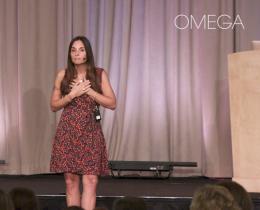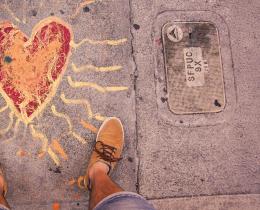
The Backpack (a poem)
It’s imaginary.
It’s heavy. Like bricks.
You may not have noticed it.
Until now.
It contains all those things you were taught to “take on.”
As women, we inherit the skill of absorbing everything around us.
We find ourselves walking around with the backpack open, and the contents increase.
Perhaps we’re conscious of some of it, while the rest is just habitual stuffing.
We all do it, but do we have to?
It’s heavy. It’s cumbersome. It’s tiring.
Why do we carry this pack and all its stuff?
Because we inherited the my-value-and-worth-are-based-on-doing-for-everyone-else story from all the preceding generations.
We innately “care,” but do we need to “wear” all the stuff?
Does caring have to mean wearing?
Does caring mean we wear the multitude of questions with no answers? All the unknowns?
The answer is NO.
When we “take it on,” we find ourselves “taken out.”
When we wear these burdens, we find we are exhausted, depleted, and depressed . . . with a heap of resentfulness.
Is it possible—with a little practice—we can learn to still “care,” but not “wear” it? The answer is YES.
A huge relief, and beneficial for all.
Your Turn: The Backpack Exercise
1. Imagine a big open backpack on your back.
Stop.
Notice.
Breathe.
What’s in your backpack right now?
Common things in one’s backpack might include: guilt for taking time for yourself, issues with work, family problems, fear of the unknown, relationship troubles, grief, shame, job uncertainties, money, health concerns, resentment, and just plain overwhelm.
Notice. Does it feel heavy? Are your shoulders weighed down? Is your neck tight?
Take a few minutes to write down what’s in your backpack:
As you inventoried your backpack, you may have noticed a plethora of burdens—yours and those belonging to others. All are equally valid. I’m not suggesting you pretend they don’t exist. But I am offering an effective tool to perhaps shift how you feel.
In the following steps, I give you the grand opportunity to make space between you and the backpack, between you and its contents. Space is your friend. Space is a healer. It’s a perspective changer.
2. Now that you’ve identified the backpack and its contents, allow yourself to feel them. Perhaps you’ll notice it really does weigh you down. Perhaps you’ll notice your shoulders are heavy and your neck is tight. Perhaps you’ll notice you’ve been holding your breath.
3. Be open to giving yourself permission to take that backpack off. What does it mean to give yourself permission? Perhaps it means exploring the questions: Who am I without the backpack? Have I told myself it is my identity to take it on? Will I lose my value, be less loved? (Notice your thoughts, any resistance. Resistance is fine—not fun, but fine. Let yourself look. Let yourself hear. There’s no blame.)
4. Envision placing the backpack on the floor, and then breathe. There is you, and there is the backpack with all its belongings. There is physical space between you and it. Notice how that feels. What is it like to have space between you and the backpack? Perhaps your shoulders are lighter. It may feel weird.
5. Next, place an imaginary warm cloak over your shoulders and breathe.
Yes, breathe. If you’ve identified heavy burdens in the backpack, your shoulders are used to the feeling of something being there. Notice any thoughts that arise. Don’t believe all of them. Especially the ones that say you should do more, be more, carry more... that you are nothing without the backpack. Be patient. Remember, you get to choose the thoughts you listen to.
6. Allow yourself to feel the range of sensations. Be open to feeling relief. You might notice you are more effective not wearing the backpack. You may well have more energy and joy. You might be physically lighter. Freeing yourself gives you access to your wisdom, intuition, and strength.
When you choose what to put in your backpack—and what to leave out—the obligatory messages (the shoulds, musts, and what ifs) dissipate, and you return to your heart space.
7. Once you have allowed yourself to remove the backpack, its contents appear different. All those unknowns are not screaming so loudly for answers. All that weight did not make you more valuable. Again, the contents are real and require your attention, but creating space between you and them allows for a new perspective, a new response, deeper breaths, more grace and ease.
Perhaps when you put the backpack down, you are more yourself, and you will learn to really like you. (I promise that you will.)
Every time you do this exercise, you have the opportunity to release stress, recharge, and realize you are already enough.
Congratulations!
It’s Not Gone Yet
But, you ask, what do I do if the backpack comes back?
The backpack WILL come back. Not because you didn’t do a great job, but because you’re used to it being there. We all are. Just notice when it returns. Remind yourself that wearing it doesn’t help anyone.
Take it off... again. Take it off every hour, every day, with every breath. The more you do this, the easier it will get. Trust me. It will lighten your load.
What If I’m Too Resistant?
Resistance is common. Sometimes it looks like blinders, sometimes it looks like moving even faster, or maybe it looks like taking on even more. Change makes us vulnerable. And we often don’t welcome traversing those trails.
Be brave. Remember why you are doing this and that you are worth it (even if you’re not “feeling” it). Practice. Baby steps. Imagine how good you will feel running without a backpack.
Your Turn
How did it feel when you took your “backpack” off?
When the backpack reappears—and it will: Are you willing to take it off again, and again, until it stays gone? Are you willing to get used to the freedom of not carrying it, and own your worth completely separate from it?
Because you’re already enough (wink)!



